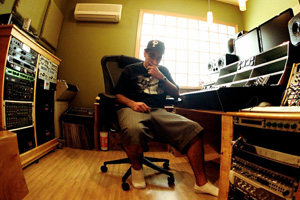via Remixmag
What’s your advice to people trying to figure out how to supplement their music income without resorting to the 9-to-5 grind?
I have been a full-time musician with expensive taste in records and gear for a long time, and believe me, it gets tough. A few things I have learned keep me stable and successful: 1. Gear: Nothing beyond the simplest setup is actually necessary. All the gear in the world is nice but not necessary — a good song or content and soul trumps everything in the end. The sound is just a very small component. It’s just the icing on the cake. 2. Industry: Everything has changed, and any musician is capable — and should attempt to — handle their own business; that way, you are in charge of where your art ends up. Look for cracks in the system and ask yourself how the old school got paid. When I did this, I realized I needed to be more involved in ASCAP — keeping things registered and carefully placing songs can keep everything financially afloat. 3. Career: Time is the greatest commodity in this industry, and staying afloat for even another year as an independent musician is worth more than any lump sum of money in the long run. Stick with it and chase your dream. Don’t be blinded by the flash-in-the-pan success that surrounds.
With the overhead that goes into being a full-time band, as well as any side ventures, what’s your business plan like?
I approach everything from the guerrilla-war mindset. We have to stick and move, stay flexible and adapt to whatever comes our way, always staying focused on the bottom line. When we tour, we travel as just us. We rent a small car, we share a hotel room and we sell our own merch. It cracks people up when they see the headline act roll up — alone, in a rental Chevy Cobalt — perform, sell their own merch and then settle up at the end of the night, driving off to the next Super 8 motel in the middle of nowhere. But at the same time, we make more net income than some groups selling out arenas. There is an enormous amount of money to be made in staying small, modest and working your ass off. There is more money in that life than I have seen Gold-selling groups make at the end of their tour. The only downside is I haven’t gotten a lot of sleep in my life.
For a custom console that costs $50K to make, what is your idea of a good business risk and one that could potentially sink the ship?
Well, that was definitely a bad business idea on my part. It just fulfilled the childhood dreams I had of having a custom console and making my own music, locked up all alone in a room. It’s a stupid business move because even Pro Tools LE can sound good if you work it right, and ultimately, when it all ends up on MP3 at 64 kbps, none of that gear matters. I just had the money saved up, partly from selling my Neve console, and said “fuck it.” If I’m going to stay analog, there’s no half stepping. Might as well go all in. But I could afford to do it. I saved up a lot of money, had an advance and paid cash out for the whole thing. To me, the worst business move is anything that has to be creatively or desperately financed. Anytime someone has to make money off of the music industry to keep from getting in credit trouble, well, I think you’re headed for desperate trouble, or at least the old sellout. I worked my way up to owning and even being able to appreciate that, from cassette 8-tracks to ADATs to tape to a Neve to the present setup. But like I said, it’s ultimately unnecessary. Keepin’ oneself debt free is the best way to stay creatively powerful and is more important than having fancy gear when it comes to making good music.




